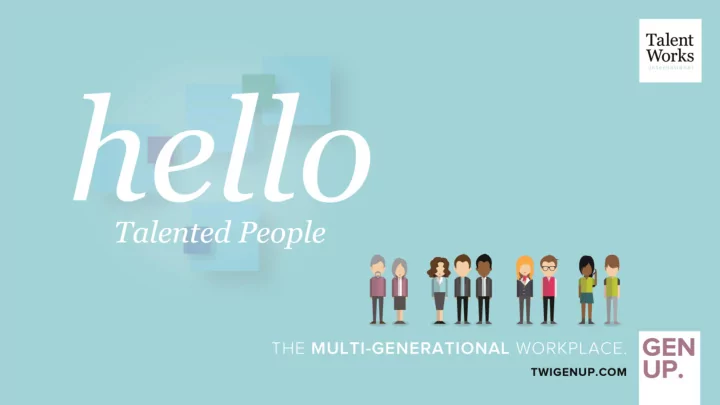

Generations in the Workplace An original TWI Research Programme
The Multi-Generational Workplace Mixing and managing four generations of employees: He wants feedback – what the heck is that? Work-life expectancy is increasing • It’s five, I’m out of here! Four different generations working side by • side in the workplace today In less than 20 years there’ll be five • generations working side by side They have no work ethic! Get a life!
The Four Generations Our Focus is on: 3
The Four Generations Born during the post – World War II baby boom. Baby Boomers They lived through the years of opportunity and optimism, with growing financial freedom and accessible long-distance travel becoming available. Born from the early 1960s to the early 1980s. Generation X Grew up in the age of emerging technology and independence, this generation created some of most influential websites of today, including Google, YouTube, and Amazon. Born from the 1980s to the early 2000s. Generation Y Generation Y have had access to growing technology such as internet and video games so they are optimal for computer based occupations. Born from the late 1990s through the 2000s. Generation Z A significant aspect is its widespread usage of the internet from a young age. Typically thought of as being comfortable with technology, and interacting on social media websites accounts for a significant portion of their socializing. 4
Baby Boomers in the UK Born between 1946 and 1965 • Coming of age between 1964 and 1983 • Age in 2016: 51-70 years • “committed, hard working and career focused” (U Cardiff) • Work ethic: “dedication, loyalty and a willingness to stay in • the same job for a long time” 28% of them have no private pension wealth at all • 18.1% of them smoke • 5
Generation X in the UK Born between 1966 and 1981 • Coming of age between 1984 and 1999 • Age in 2016: 35-50 years • “latch -key kids (often left alone at home because both • parents were working) – which explains their independent, resourceful and adaptable approach to work” (U Cardiff) Work ethic: “entrepreneurial spirit, a do -it-yourself attitude • and, in contrast to the generations before them, embrace change in the workplace” 20.4% of them smoke • 6
Generation Y in the UK Born between 1982 and 1994 • Coming of age between 2000 and 2012 • Age in 2016: 22-34 years • “technological whiz kids” (U Cardiff) • Work ethic: “excellent multi - taskers […] they are impatient • and require instant gratification as they have always had all the information they need at their fingertips via the internet” “smart, creative, productive and achievement - oriented’ • 23.3% of them smoke • 7
Generation Z in the UK Born between 1995 and 2009 • Coming of age between 2013 and 2027 • Age in 2016: 6-21 years • 8
Workplace generational interaction little understood ? What unites them? • What divides them? • How employers can communicate, train and retain each • generation? How should each generation be managed in a way that drives • performance, innovation and teamwork? Are their different learning styles being accommodated? • Do the generations feel they have a voice? • How employers can unlock the potential of each generation? •
A unique programme of research • It’s critical that the gap in understanding the multi -generational workplace is plugged • An original TWI research programme will provide employers with a unique understanding of the workplace generational differences • It will position TWI as the sector’s go -to agency for cross-generational insight
What we’ll discover • How an ageing workforce is disrupting the workplace with o Specific challenges for management new challenges o How to minimise • The expectations and priorities that unite and divide each inter-generational conflict generation How to unlock each generation’s potential o • How employers’ expectations and priorities compare and How to attract and keep tomorrow’s o contrast with those of each generation employees – Generation Alpha • The opportunities and challenges created by having four generations working side by side
Scope We’ll compare and contrast their expectations regarding: We’ll learn how each generation views: • The ideal employer o What it means to care for staff • o The ideal employee Training and development • The ideal work environment o Recognition • The ideal workplace culture o Communication • The ideal onboarding programme o Their career aspirations o Their work ethic o How job hunters from each generation use information sources and what influences them
Scope Older workers will be questioned to find out: o As participation in workplace training nosedives once workers hit their mid- 50s, we’ll ask how training opportunities can be made more attractive for older workers We’ll discover why growing numbers of staff are taking early retirement o We’ll learn how to persuade them to remain in or return to the workplace o
Scope – research tools we’ll use Video diaries Focus group discussions Scope What Research Tools Filmed day-in- the-life sessions will we use? Interviews Online surveys
A range of powerful outputs Webinars Conference and Networking Events Microsite Twitter Vlog and Blog
Next steps Phase 3 Phase 1 Phase 2
thanks for listening
Recommend
More recommend